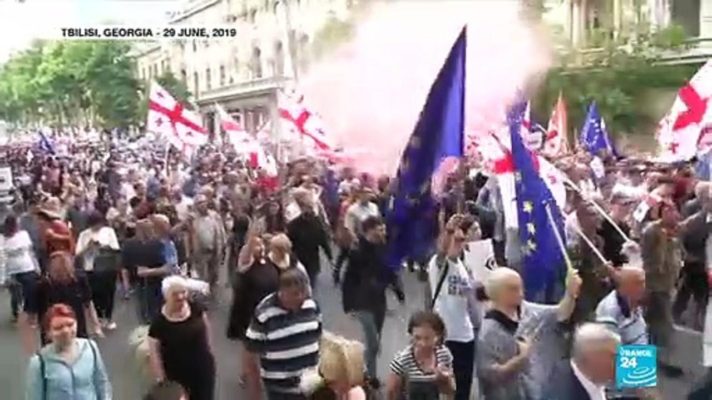
Georgia raids the United National Movement offices and arrests its leader, prompting condemnation from some Western diplomats.
Thousands of demonstrators have blocked the main avenue in Georgia’s capital Tbilisi, protesting the arrest of Nika Melia, the leader of the country’s main opposition party.

The crowd gathered outside Tbilisi’s State Chancellery and later the nearby parliament building on Tuesday, blocking the Rustaveli Avenue, demanded Melia’s immediate release and early elections.
The development came several hours after the police stormed the United National Movement (UNM) headquarters and arrested Melia days after the prime minister resigned after a disagreement over whether to take the prominent politician into custody.
The leader of another opposition party, Lelo, called for “a peaceful, unwavering struggle to defend Georgian democracy”.
“Liberation of political prisoners and snap parliamentary elections are the only possible way out of the crisis,” Mamuka Khazaradze said, speaking to journalists on behalf of all opposition leaders.
 Georgian law enforcement officers arrest opposition leader Nika Melia
Georgian law enforcement officers arrest opposition leader Nika Melia
Al Jazeera’s Robin Forestier-Walker, reporting from Tbilisi, said more people were expected to join the protesters later in the day, but the numbers could be affected by the coronavirus-related 9pm curfew in force across the country.
“The opposition is very angry about what happened. There are calls for a snap election. Even some members of the government party are saying that there might be time for a snap election,” he said.
Live television footage showed Melia being dragged from his office to be placed in pre-trial detention early on Tuesday.
Hundreds of riot police used tear gas against his supporters who camped out in the building, images broadcast by Mtavari TV showed. Dozens of opposition backers were also arrested.
Footage from inside UNM offices published by the Sputnik Georgia media outlet showed Melia barricaded inside a room with some of his supporters, while opposition activists clashed with police on the street.
A Tbilisi court last week ruled to place Melia – who is accused of organising “mass violence” during anti-government protests in 2019 – in pre-trial detention.
“We call on both the representatives of political parties and their supporters to protest in a peaceful manner to refrain from violent actions and not interfere with the court’s decision,” Sputnik Georgia quoted the interior ministry as saying, referring to the order to have Melia detained.
The ministry added in a statement that “police used proportional force and special means” in the police operation.
Georgia has been in the grip of a political crisis since last October’s parliamentary elections, which opposition parties have denounced as rigged.
“In no case they can prevent freedom-loving Georgian people protesting … This is the end of the regime. They will not maintain power with the support of this strong special forces,” said Melia.
Former Georgian Prime Minister Giorgi Gakharia, who resigned last week over the court ruling, said arresting the opposition leader could lead to the further escalation of the political crisis and threaten the wellbeing of the country’s citizens.
News of the plan to detain Melia sparked outrage among the opposition and warnings from the ex-Soviet country’s Western allies.
“Shocked by the scenes at UNM headquarters this morning,” British ambassador Mark Clayton wrote on Twitter. “Violence and chaos in Tbilisi are the last thing Georgia needs right now. I urge all sides to act with restraint, now and in the coming days.”
In the wake of Gakharia’s resignation, the opposition called for snap parliamentary polls.
Last week, the United States and the European Union called on Georgia’s government to resolve the crisis peacefully and to ensure its judicial system stays free of political bias.
Melia, 41, has dismissed the charges laid against him of “organising mass violence” during anti-government protests in 2019 as politically motivated.
In power since 2012, Georgian Dream party has seen its popularity fall over its failure to address economic stagnation and perceived backsliding on commitments to democracy.
Melia’s arrest order has raised the stakes in the crisis over the disputed elections. Opposition members have refused to take up their seats in the new parliament in a boycott that weighs heavily on the ruling party’s political legitimacy.
 Georgian security officers detain an opposition supporter after storming the United National Movement (UNM) opposition party office in Tbilisi
Georgian security officers detain an opposition supporter after storming the United National Movement (UNM) opposition party office in Tbilisi
Georgia’s new Prime Minister Irakli Garibashvili, who was confirmed by parliament on Monday, said in an address to legislators his government would proceed with Melia’s arrest, saying the politician “will not manage to hide from justice”.
Garibashvili is a loyal lieutenant of the powerful oligarch Bidzina Ivanishvili who is widely seen as the man in charge in Georgia, despite having no official political role.
Analysts said the spiralling political crisis in Georgia is fraught with serious consequences for the fledgling democracy and is unlikely to be resolved without a greater diplomatic engagement from Tbilisi’s Western allies.
Matthew Bryza, a senior fellow at US think-tank the Atlantic Council, said Georgia’s “backward movement in terms of democracy” under Georgian Dream reached the point where “opposition parties say they can’t take their seats in parliament because the democratic system in Georgia is broken”.
“Without a greater Western mediation, the situation could become very dangerous,” said the former diplomat who coordinated the US Caucasus policy in the administration of ex-President George W Bus
